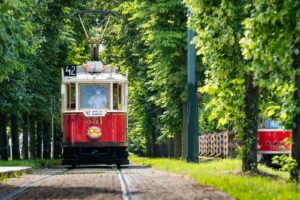45th CONFERENCE 2022
28-31 August 2022, Prague, Czech Republic
Theme: Sustaining our museums in a challenging world

With out first in-person opportunity to meet and work together since our Berlin conference in 2019, this year we are hosted by museum colleagues in Prague. Based in the city’s museums, we look at three key questions; our environmental sustainability in the face of climate change, the relevance of our museums to the changing society around us and what we have learned from the pandemic years.
Accommodation at a discount has been arranged for conference delegates in the Hotel Belvedere in central Prague and close to all the conference venues, i.e. within 10-15 minute walk or 5-minute tram ride. Delegates are encouraged to extend their stay in this beautiful city before or after the conference at discounted rates.
There are currently no Covid or visa restrictions on entering the Czech Republic.
Programme
| Sunday, 28 August: Postal Museum | ||
| 16:00-17:30 | IATM Board Meeting at Belvedere Hotel | |
| 19:00-21:00 |
Welcome drink and cold buffet in the Czech Postal Museum Short introduction to Prague and its transport and postal history. View exhibition “Behind the Horizon” (How international mail have changed over time) |
|
| Monday, 29 August: National Technical Museum (NTM) | ||
| 09:30 | Welcome address by NTM | |
| 09:45 | Session 1: Museums as advocates for environmental sustainability | |
|
Chair and Introduction: Sam Mullins, IATM President |
||
|
Keynote Address (by recorded video) Museums are an important element of a sustainable society, bringing communities together to learn from and celebrate our culture and collective history. They are also more than that– they have earned authority and respect, creating spaces that not only celebrate humanities achievements and natural history, but also enable difficult conversations about what we got wrong in the past. That learning is vital for future prosperity, but could they do more? How can museums help us learn not just from the past, but also from the present? Are there things we accept now that future generations can’t comprehend we accepted or worse condemn us for? What are those issues with strong evidence for radical change, but about which it is difficult to have open conversations without fear? |
||
|
Thomas Barthelt (Swiss Transport Museum, Lucerne) In April 2023, the Verkehrshaus der Schweiz will open a new exhibition hall. Already, the Swiss Museum of Transport displays a wide range of topics about rail, road, water and air transport as well as communication and an international space exhibition. Furthermore the superordinated topic “energy” will be part of the most visited museum in Switzerland. Energy, sustainability, climate change, natural resources, etc. will be conveyed to the visitors in an exhibition in the form of a learning lab. This concept will be complemented by a living lab and a collaboration platform. |
||
|
Corinna Engel (Frankfurt Communications Museum) In 2020, the team of the Museum Foundation Post and Telecommunications decided on an exhibition about climate change. The focus should not be on the scientific facts, but rather on communication and the question: how can change succeed? The exhibition concept, which started with the idea of on an inner journey, also convinced sponsors and public institutions. The work on discussions and regular presentations of the concept had a strong impact on all employees of the museum. Already the path from exhibition preparation to implementation is characterized by dialogue, processing and valuable actions of a unusually large number of participants. The museum becomes an instigator for sustainable action. |
||
| 11:15 | Break | |
|
Dr Michael Vogt, Director/CEO, Dresden Transport Museum |
||
|
Joachim Breuninger, Director German Technical Museum, Berlin The Deutsches Technikmuseum has undergone a strategy process in the last 12 months. One outcome is to focus the whole museum in the future on mega-topics like sustainability, globalization, climate change and energy transition. Upcoming exhibitions will reflect on these topics, starting with the exhibition „Repairing“, we will talk about the fact, that we cannot or do not repair things anymore, instead of throwing them away and buying new. The exhibition will question this habit and it will work together with repair initiatives from around Berlin. The exhibition itself will be sustainable and will be reused or at least recycled. |
||
|
Peter Ovenstone The Fossil Fuels Report project is a collaboration between European industrial and transport heritage bodies: ERIH – European Route of Industrial Heritage; Europa Nostra – Industrial & Engineering Heritage Committee; Fedecrail – European Federation of Museum & Tourist Railways; FIVA Federation Internationale des Vehicules Anciennes (road transport). This project will raise awareness in key public bodies across Europe of the economic and social value of industrial and mobile heritage and also awareness of the critical importance of continued authorisation and supply of traditional fossil fuels for continued operation of historic industrial sites and transport. |
||
|
Dr Meredith Greiling, Principal Curator of Technology, National Museums Scotland Scotland’s cities are experiencing a revolution in smart, sustainable transport and active travel. City centre transformation schemes were radically accelerated by Covid-19, prioritising pedestrians and cyclists over motor vehicles in response to the public health emergency. Concurrently, electric vehicles, cargo bike delivery collectives, bike hire schemes, an extended tram network and hydrogen-powered buses are making an impact on Scottish cities. This presentation provides case studies of recent acquisitions made by National Museums Scotland: the Lutz Pathfinder Pod, a prototype fully autonomous vehicle, and items relating to Edinburgh’s Cargo Bike Movement, bringing together two ends of the sustainable transport technology spectrum. |
||
|
Lara Feguenne, Musée des transports en commun, Wallonia Transport Museum, Belgium. The presentation outlines the museum’s activities to raise awareness about sustainable mobility through its exhibition, research and education programmes. The presentation will also focus on a case study of one of the museum’s education programme: “Mobility and intermodality, yesterday and today”. This one-day session consists of a museum visit and an “intermodal rally” in the city, during which the participants will experience urban mobility. This “rally outside the walls” of the museum is an original, fun, dynamic and didactic tool to raise awareness about sustainable urban mobility. |
||
| 12:30 | Lunch | |
| 14:00 | Session 2: How can our museums stay relevant in a fast-changing world? | |
| Chair and introduction: Laura Wright, London Postal Museum and IATM board member | ||
|
Postal Museum London |
||
|
Sam Mullins OBE, Director, London Transport Museum To create a credible and engaging exhibition about the transport staff who were recruited directly from the Caribbean islands in the 1950s, curators worked closely with an advisory group drawn from the London Caribbean communities to better understand the experiences of new recruits arriving in London, as they faced bad weather, poor housing and racism many miles from home but nonetheless kept the capital city moving. |
||
|
Elina Holopainen, Head of Collections and Marina Bergström, Head of Exhibitions at the Finnish Railway Museum A case study of how museums can promote diversity by encouraging their audiences to participate in collecting and preserving the cultural heritage. To make volunteering more accessible and more meaningful for the volunteer and to offer better ways to reach and offer participation to people from different backgrounds and from larger geographical area. We also wanted to give opportunities to volunteer virtually using the methods of citizen science and crowdsourcing. The project was open to everyone to participate, but the target group was especially people interested in railways, museum work, heritage preservation and local history. Civic research, virtual platforms and remote connections provided an opportunity to record and participate in the activities of the specialty throughout Finland. |
||
|
Terry Slobodian, President & CEO and Curator, the Royal Aviation Museum of Western Canada (RAMWC) Extensive market research which led to the rebranding of the museum and the identification of three key target markets. Exhibits and programming were developed after meeting one on one with 60-70 stakeholders from all levels of education and the aviation and aerospace industry to discover the leadership role they were all asking us to play in addressing the critical skills shortage in the aviation and aerospace industry in Canada. This led to the establishment of the RAMWC Center of Excellence Commitment to Truth and Reconciliation and the Calls to Action related to museums and the hiring of an Indigenous Curator to ensure indigenous inclusion and that our museum would become a safe place in which reconciliation occurs. |
||
| 16:00 | Coffee Break | |
| 16:30 | Guided tours of NTM exhibitions | |
| 19:00 | Conference dinner on a steamer – cruise and buffet on the Vltava river | |
| Tuesday, 30 August: Museum of Prague Transport | ||
| 09:30 | Welcome address | |
| 10:00 | Session 3: What have we learned from the Covid-19 years? | |
|
Mikki Nykänen, Deputy Director, Head of Information and Collection Services, Finnish Postal Museum Resilience and uncertainty – short and long-term crises and their influence on museum work |
||
| Workshop led by Sam Mullins, IATM President, contributions from IATM Board Members and open to all delegates – discussion to follow | ||
| 11:00 | Break | |
|
Members Meeting – led by Sam Mullins, IATM President, and Oliver Götze, Treasurer What do you as members want from the IATM board? Your chance to discuss and tell us what you want as a member in 2023 and into the future. |
||
|
IATM General Assembly – led Stephen Quick, IATM Past President President and Treasurer’s reports |
||
| 13:00 | Lunch | |
| 14:00 | Museum tour | |
| 15:00 | Coffee break | |
| 17:00 | Ride on the historic tram around Prague with English speaking guide | |
| 19:00 | Dinner in a restaurant in a former tram depot in a beautiful park | |
| Wednesday, 31 August: Excursion to Czech Railway Museum Lužná u Rakovníka | ||
| 08:00 |
Departure by special heritage train to Lužná u Rakovníka Snack on the train |
|
| 10:00 | Czech Railway Museum | |
| 13:00 | Lunch in the garden | |
| 15:30 | Departure by special train back to Prague | |
| 18:00 | Arrival in Prague | |
Conference rates
includes all evening events and transport
| IATM member | |
| Participant | EUR 300 |
| Accompanying person | EUR 220 |
| non IATM member | |
| Participant | EUR 380 |
| Accompanying person | EUR 220 |
| Day rate for Czech delegates | |
| Sunday | 700CZK |
| Monday | 3350CZK |
| Tuesday | 1700CZK |
| Wednesday | 1450CZK |
Conference Hotel
We have arranged discounted rates (Promo Code: MUSEUM) at the Hotel Belvedere, Milady Horakove 19, in central Prague, close to all three conference venues. Delegates should book their own rooms and the discount is available whatever your length of stay by emailing direct to the manager, Mrs. Chmelová – chmelova@hhotels.cz
Rates:
Single room: 68€/night incl. breakfast
Double room: 72€/night incl. breakfast
Triple room: 92€/night incl. breakfast
Cancellations
Cancellation of registration must be made in writing before 14th August 2022. No fees will be refunded after this date. A processing fee of EUR 30 will be deducted from all refunds. Cancellations made before 28th July 2022, refund of 100% of the registration fee minus bank charges and processing fee; cancellations made 29 July – 14 August, refund 50% of the registration fee minus bank charges and processing fee.
